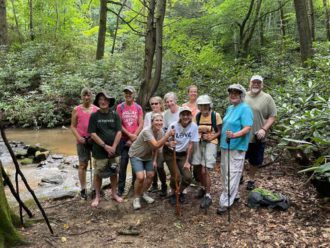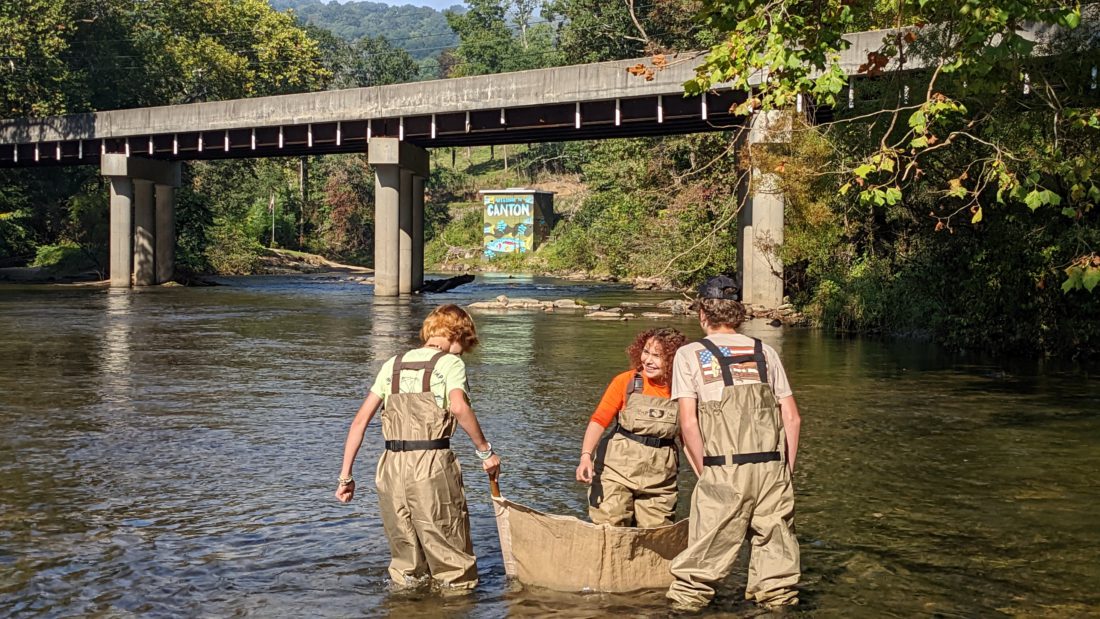In Haywood County, water quality is a local matter.
That’s because every waterway in the county originates entirely within its borders. Creeks, streams and even the Pigeon River begin their journeys downstream as springs, rainfall or runoff that accumulates high in the mountains.
“No water enters the county, it only exits,” says Preston Jacobsen, executive director of the nonprofit Haywood Waterways Association. “We are one of two counties in the nation where our county boundaries overlap, align or fall within a watershed boundary itself. All of this gets to the point that it’s our responsibility. There’s no one else that we can complain to for issues that arise.”
Formed in 1998, HWA works to reduce nonpoint pollution in the Pigeon River Watershed through education, restoration and monitoring. The group partners with government agencies, schools and others on water quality issues in the county of 62,000 people.
Such a local approach is not unique to HWA. Many nonprofit groups throughout Western North Carolina find that focusing their efforts on specific communities is the most effective way to get results.
“We have our ear to the ground locally,” says Gerard Prendergast, president of the Saluda Community Land Trust, which aims to preserve Saluda’s rural character. “We focus in on the people, the community and the land right here. Saluda is a small town, and everyone knows everyone. They let us know what needs to be done.”
Similarly, the Hickory Nut Gorge Foundation gives grants to help charitable organizations in small communities like Gerton, Chimney Rock, Lake Lure and Bill’s Creek.
“The Hickory Nut Gorge area is a little bit isolated,” says Jack Barton, the group’s treasurer. “It’s 45 minutes from anywhere. So the idea is that we’ll have more impact if we stay local and work local because a lot of the other organizations might not reach us. We can try to help this area in little ways.”
As part of Xpress’ annual Sustainability Series, we look at examples of three WNC nonprofits that embody the motto “think globally, act locally.”
Preserving Saluda
The Saluda Community Land Trust was created in 2007 by a group of residents who wanted to preserve the small-town character and rural feeling of the city of about 600 that lies in both Polk and Henderson counties.
“We’re not opposed to growth,” Prendergast says. “Growth is natural, and it happens, but we don’t want to lose all our farmland and the way of life that that represents. Nature is an integral part of living here, and we don’t want to lose touch with the nature that brought us here and that we love.”

The group works to preserve undeveloped land in commercial and residential areas for agricultural or public use, establishes greenways and parks and works to educate the public. In the last year alone, Prendergast says, the land trust has nearly tripled the amount of land under its stewardship to more than 1,000 acres.
Over the years, SCLT has helped create eight nature parks, including Little Park, Judd’s Peak, the Bradley Nature Preserve, the Missing 40 Trail and the almost completed Henry’s Nature Center, an environmental education site for children.
The center, built on land bought in foreclosure, will include an outdoor pavilion, beds for growing native plants and walking trails.
“Children will learn about the land they live in,” Prendergast says. “It’s important to get them outside because they’re the future stewards of the land. We need to get kids involved, not just retirees like myself.”
For the same reasons, the group offers free swimming lessons each summer at Twin Lakes, a rural retreat bequeathed to it in 2012.
Other projects include a hemlock recycling program, kudzu control, forest management, botanical studies, conservation easements, stream stabilization, a community garden and a public dog park. Plans also include an African American history trail.
“We’ve done a lot, but there’s so much more to do,” Prendergast says. “So you never sit still and say, ‘OK, we’re doing great.’ It always feels that we can do more.”
Helping Hickory Nut Gorge
Hickory Nut Gorge is a 14-mile-long canyon that cuts through the Blue Ridge Mountains and includes rural communities like Gerton, Bat Cave, Lake Lure and Bill’s Creek, as well as Chimney Rock State Park. It lies primarily in Rutherford County but also extends a bit into Henderson County.
Established in 2006, the Hickory Nut Gorge Foundation is a philanthropic endowment that provides grants to nonprofits and charitable organizations for gorge-centric projects. The foundation’s board has given an estimated $40,000 through 40 grants.
While some of the money has gone to environmental preservation groups — including Conserving Carolina and the Lake Lure Flowering Bridge — much of it has been awarded to nonprofits serving more general community needs. For instance, the foundation has awarded grants to charter school Lake Lure Classical Academy, the Lake Lure Farmers Market, Habitat for Humanity and Friends of the Mountains Branch Library, which used the money for a bookmobile.
In 2022, HNGF gave $5,000 to Hickory Nut Gorge Outreach, which addresses food insecurity, to pay for Christmas meals. And during the COVID-19 pandemic in 2020, it provided money for food and telemedicine programs being run by local organizations.
“Our granting process is not very formal at all,” Barton explains. “So we were able to jump on things like that. If a need just really pops up, we can be there without spending too much time deliberating.”
The organization’s endowment began with an anonymous donation of $25,000 and has grown to more than $400,000. The money is held and invested by the Community Foundation of Western North Carolina.
Most of the new money for the endowment comes in from small pledges of, say, $250 a year for 10 years, Barton says.
“You can start very small and still be a part of something that’s going to continue forever,” he says. “Because if you give $200 to a food bank or something, well, that $200 is gone. But if you give that same $200 to an endowment, then some part of that is going to be there every year. You don’t have to be Bill Gates or anybody to set up a huge endowment. You can contribute to a very small one in a very small way and still have an impact.”
Protecting the water
Like the other nonprofit groups, the Waynesville-based Haywood Waterways Association sees education as key to a sustainable future.
Each September, the association works with Haywood County Schools to help teach 600 or so eighth graders about water quality. Part of that is the Kids in the Creek program.
“We take them all out to the Pigeon [River], put them in waders, and we’ll do things like shock the fish, so they can collect them, count and ID them,” Jacobsen explains. “Sometimes they fall; they have a good time, they’re collecting samples and collecting bugs to identify the health of the stream. We do a follow-up assessment in the classroom, and we’ve seen wonderful data come out of this to prove that environmental literacy and stewardship have increased.”
It also sees restoration and monitoring as key to its mission. HWA has secured eight grants worth about $3.2 million to do restoration work in the next few years.
“Our No. 1 polluter continues to be sedimentation — dirt in the water, if you will,” Jacobsen says. “So we do a lot of work to improve and repair and bring back stream banks that are failing. If there are issues related to sewage, stormwater or contamination to our waterways, we go after the grants and do the work to rectify and restore that site.”
Among other accomplishments, HWA has:
- Procured a $2 million grant to reduce flooding risk in Canton, Clyde and Cruso, areas devastated by the effects of hurricanes Frances and Ivan in 2004 and Tropical Storm Fred in 2021.
- Worked with the Haywood County Health Department to remove and replace 195 septic repair systems since 2006.
- Monitored 26 sites in the county for water quality.
- Contracted with the towns of Waynesville and Clyde for some stormwater monitoring.
“If you live here, you want to protect your home and you’re more passionate about the work,” Jacobsen says. “We’ve got the ability to enact an idea, gather the funds, put those funds to work without interruption and then to ensure that the success from that project carries into that second opportunity. Everybody here in the county, we meet regularly, all the same time, all in the same room. We hash out all of our issues, and then we go after the same solutions together. That approach is the only approach to get things done.”
Sidebar/box
Want to help?
To donate to one of these nonprofits, follow the link:
Haywood Waterways Association: avl.mx/di7
Hickory Nut Gorge Foundation: avl.mx/di8
Saluda Community Land Trust: avl.mx/di9




Before you comment
The comments section is here to provide a platform for civil dialogue on the issues we face together as a local community. Xpress is committed to offering this platform for all voices, but when the tone of the discussion gets nasty or strays off topic, we believe many people choose not to participate. Xpress editors are determined to moderate comments to ensure a constructive interchange is maintained. All comments judged not to be in keeping with the spirit of civil discourse will be removed and repeat violators will be banned. See here for our terms of service. Thank you for being part of this effort to promote respectful discussion.